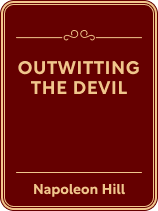

This article is an excerpt from the Shortform book guide to "Outwitting the Devil" by Napoleon Hill. Shortform has the world's best summaries and analyses of books you should be reading.
Like this article? Sign up for a free trial here .
How does the devil operate? How does he seek to manipulate you?
According to Napoleon Hill, author of Outwitting the Devil, the devil is a threat to you now, not after you die. In the book, Hill argues that you can outmaneuver the devil if you go to work against him in the right way. First, you must understand how he operates. Hill asserts that the devil seeks to rob you of success and fulfillment by manipulating your desires and fears.
Continue reading to learn more about this view of how the devil works.
How the Devil Works
The three main characteristics of the devil as Hill describes him are:
- He doesn’t have a physical form but exists as negative energy and negative thoughts.
- He’s an essential part of the universe, and can’t be truly defeated; while God represents all that is positive in nature, the devil represents all that is negative, and just as day can’t exist without night, life can’t exist without both God and the devil locked in a constant struggle.
- He does not torture people in Hell after death, but instead attempts to gain control of them throughout their lives, and, if he succeeds, absorbs them into himself after death.
Hill argues that the primary way the devil works is not after death, but in the course of your life, and so you must commit to resisting him each and every day. While the devil cannot be permanently defeated, he can be avoided by someone who is strong of character and who commits to practicing Hill’s principles for success.
| Different Visions of the Devil The devil, or Satan, has been imagined in radically different ways throughout history. At various points in Christian theology, he has been described as the snake in the Garden of Eden, a fallen angel, and a red creature with goat hooves, horns, a tail, and a pitchfork. His role has also changed, from an instrument of God used to punish and accuse sinful humans, to the personification of all evil and God’s opposite. In his description, Hill seems to subscribe to the theory that Satan is both the source of all evil and a part of God’s plan. He describes the devil as a needed part of the universe and dismisses the idea that his role is to be a “punisher” in Hell, focusing instead on his ability to “test” people by entering their minds and tempting them to indulge their desires. According to Hill, you should not fear Satan, but recognize his attempts to manipulate you and resist them—this will bring you closer to godliness, and, therefore, to success. This aligns with a more contemporary view of the devil that emphasizes his usefulness as a vehicle for personal growth over his punitive instincts. |
Hill claims that the devil has two ways of manipulating people away from professional success and personal fulfillment: through their desires and through their fears. We’ll explore each of these in the following sections.
Desires
Hill argues that the devil can manipulate people’s desires to turn them towards bad habits, which position their bodies and immobilize their minds, keeping their focus on short-term gratification rather than long-term goals. These habits include things like smoking, excessive drinking, gambling, or excessive spending.
The ten desires Hill names are:
- Desire for sex
- Desire for food
- Desire for self-expression
- Desire for life after death
- Desire for wealth
- Desire for knowledge
- Desire for power
- Desire to be like others
- Desire to be better than others
All of these desires are natural to have, but the devil encourages you to pursue them recklessly, with no regard for the long-term consequences or any kind of plan. In the end, his influence leads you to those bad habits which damage your mind and body.
| The Seven Deadly Sins Hill’s description of these desires has some commonalities with Christian understandings of the seven deadly sins: lust (desire for sex), gluttony (desire for food and knowledge), greed (desire for life after death, wealth, and power), sloth, wrath, envy (desire to be like others), and pride (desire for self-expression and to be better than others). While traditionally a Catholic theory of sinful behavior, the idea of the seven sins was popularized by famous works of literature like Dante’s Inferno and Chaucer’s The Canterbury Tales and provides a framework for confession and acts of penance in many different Christian churches today. The sins are often paired with the seven heavenly virtues, which describe the ideal of how you should behave in the face of your desires: chastity, temperance, generosity, diligence, patience, gratitude, and humility. These heavenly virtues take work to achieve, but practicing them is believed to make you stronger, healthier, and more compassionate over the course of your life. In contrast, indulging your desires may be pleasant in the short term, but this lack of self-control will ultimately damage your willpower and your relationships. |
Fears
While desires matter, Hill argues that the devil does not claim the majority of his victims through excesses in their behavior but rather through immobilization—he uses fear to keep people from taking any action, or, at the very least, from taking risks that might lead them to profit. When you are controlled by fear, you aren’t able to focus on thinking about your goals or what you want out of life, and even if you could, you don’t have the confidence to pursue those things.
According to Hill, the devil preys on seven distinct types of fear:
- Fear of poverty
- Fear of being criticized
- Fear of illness
- Fear of being unloved
- Fear of aging
- Fear of death
- Fear of failure
Of these fears, Hill names the fear of death and the fear of poverty as the most powerful. People will do almost anything in the hope of escaping them, leading to impulsive decisions regarding their finances or health.
(Shortform note: While, as Hill argues, fear can keep us from taking risks, fear can also be an incredible motivator. The fight-or-flight instinct is ingrained in us as a natural response to danger, and just as it’s natural to want things like money or food, it’s natural to be afraid of things that could harm us or make us unhappy. However, actions motivated by fear are often impulsive, short-sighted, and directionless. When you act out of fear, you’re not in control of yourself, and according to Hill, that provides an opportunity for the devil. Your decision-making should be directed, cautious, and forward-thinking whenever possible.)

———End of Preview———
Like what you just read? Read the rest of the world's best book summary and analysis of Napoleon Hill's "Outwitting the Devil" at Shortform .
Here's what you'll find in our full Outwitting the Devil summary :
- How failure and bad habits keep people from reaching their potential
- How to escape the Devil’s influence and avoid being turned toward inaction
- How to find your way to professional and financial success






